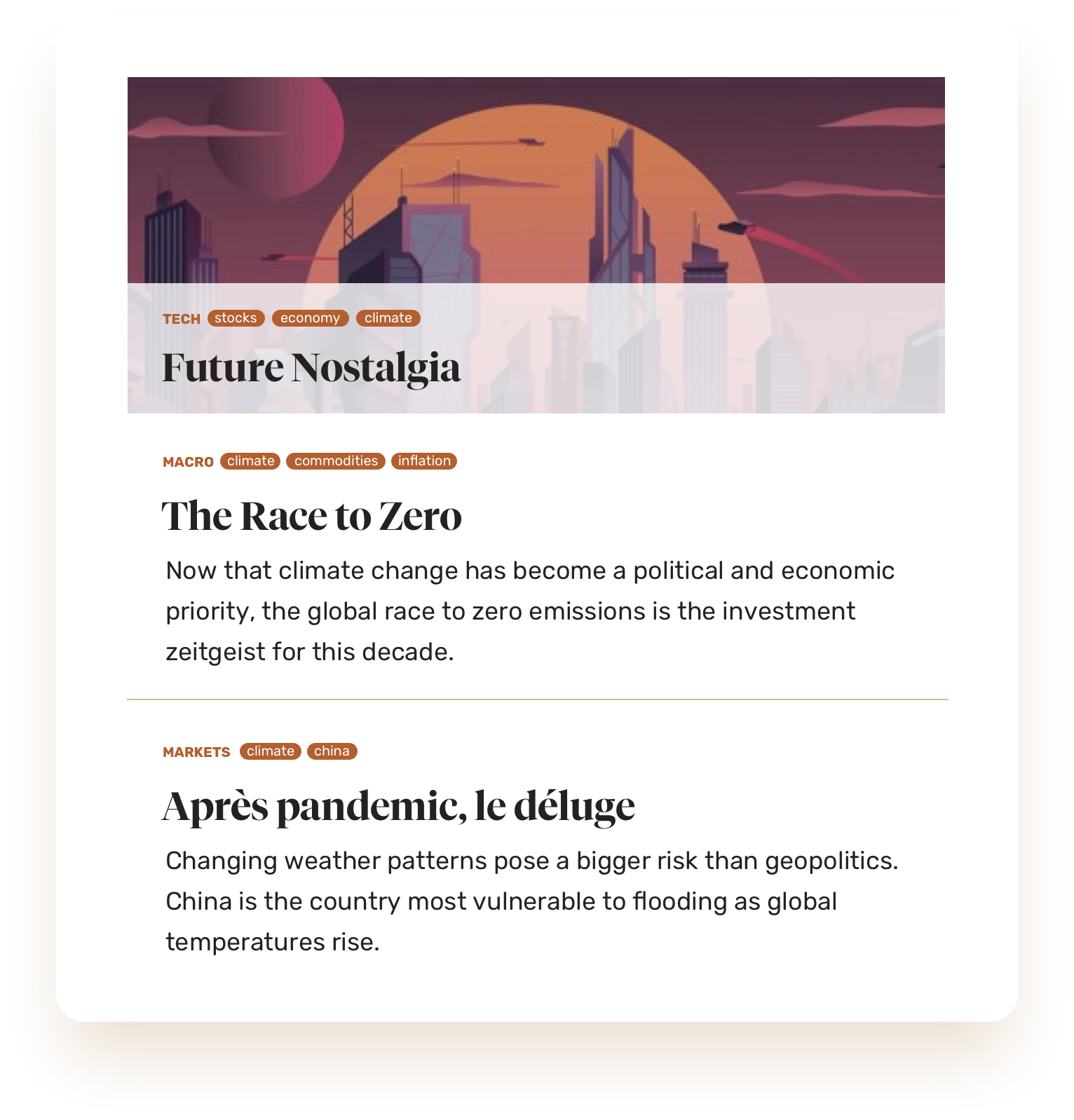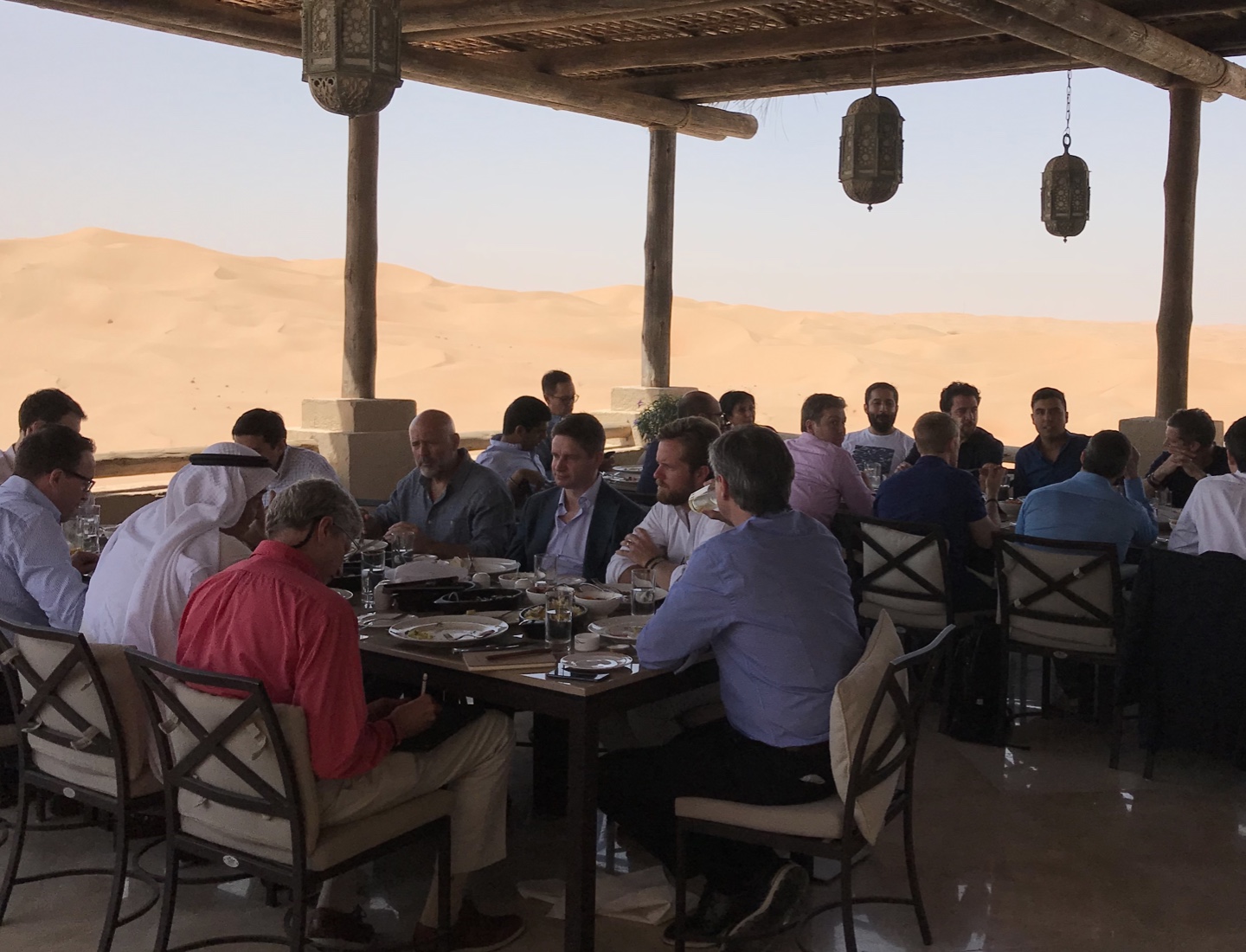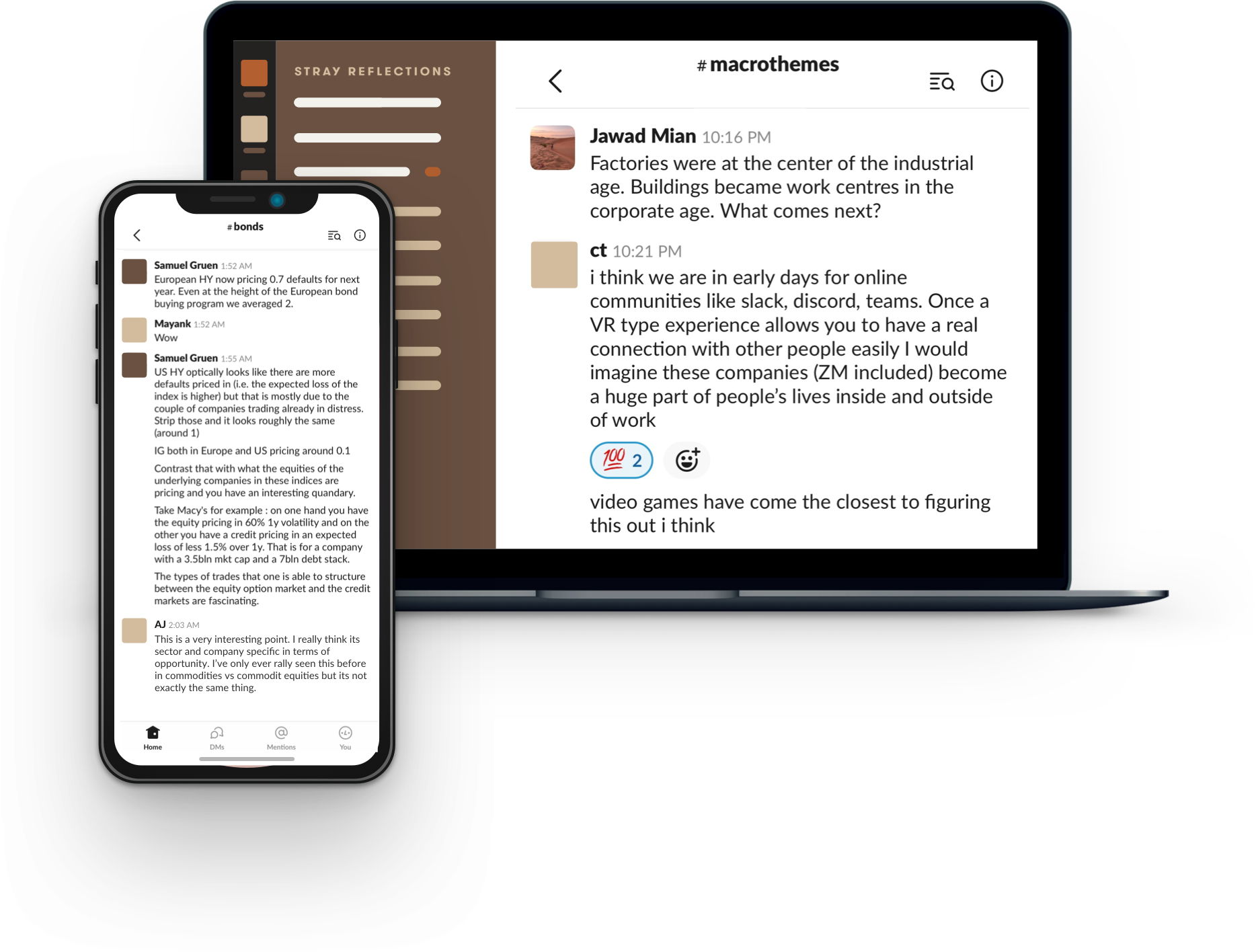Macro themes that dominated the market for the last fifteen months—Covid, WFH, then vaccine/reopening—are fading. What comes next?
Accurately identifying which new habits that formed during the pandemic are durable is going to be essential. Gavin Baker, CIO of Atreides Management, joined us to identify these trends and discuss the outlook for secular growth stocks.
Here’s a pared-down version of our salon. You can watch the full interview here.
On tech facing a regime change
“It’s all going to come down to what happens with inflation and rates around the end of the third or beginning of the fourth quarter this year. We will know around then if inflation is transitory or structural. If this is structural, then there will be a regime change. It’s highly unpredictable how tech and growth will perform in that regime.
“Tech performed terribly in the seventies, but tech companies today are not the same as tech companies back then. They were generally very asset heavy; they had manufacturing plants in the United States, they were making computers.
“Warren Buffett said inflation swindles the equity investor by compressing return on assets due to the inflation in assets. But over the very long term, the compounded returns of the stock should converge with its return on invested capital (ROIC). The highest ROIC firms in the market today are tech companies. With rates rising, the discounting of future cash flows will pressure multiples. But the fact that they have high ROIC means they are not going to be fundamentally affected by inflation.
“Thinking in terms of value and growth leads to a fixed mindset. I try to be a make money investor, so I instead think about GDP sensitive versus secular. The essence of being secular is you can grow independent of GDP. A lot of these tech companies did really show they were secular growth stocks last year because we went through a sharp, but severe recession and they grew right through it. Now, they were helped by work from home dynamics, but I think you would see a lot of these companies grow through most recessions because they are secular.”
On portfolio positioning
“I’ve lived through multiple cycles. The first market I saw was the Nasdaq going down 80 percent, so I’m always worried. In 2000, the big cap tech stocks were very expensive. Today, nobody can look at them and say these are expensive stocks. They’re just not, full stop.
“A lot of the mid cap names are very expensive, but there are some amazing companies in there where I believe in the long-term fundamentals. We don’t own them if they can only be valued using EV to Sales because that is my hedge against a nightmare scenario.
“My mantra beginning in June and July 2020 was no new recurring revenue names in the book. Everybody loves recurring revenue, but it is definitionally secular, and not sensitive to GDP. After having the best relative revisions in 2020, I believed they would have the worst relative revisions in 2021. I’ve relaxed that mantra a bit since software is down about 20 percent this year, and retail and travel names are up 50 to 100 percent. It’s been priced in now so I can relax the recurring revenue restriction.
“I think we are in a stock pickers’ market for a while. Risk reward is more evenly balanced now. It will be this way for another six months until it becomes clear whether we are in a regime change or not. The one bias I have had is putting names in our book that you can value on earnings, free cash flow, and EBITDA, which is to protect against a possible regime change.
“I am trying to be reasonably well positioned by having a balanced portfolio. This means buying back secular growth names that can be valued on earnings and free cash flow and keeping the consumer cyclicals that structurally improved their business models during Covid.
“Our top positions are things like Dick’s Sporting Goods, American Eagle, and Inditex. But we also now own Twitter and AMD.”
On which new habits will stick
“The big calls to make in the world of tech are the durability of work from home, business travel, and returning to the gym.
“Broadly speaking all the CEOs want to go back to the office, but there are a lot of people who do not want to go back to the office. That is going to be an important collision to watch, especially since everyone is competing for talent.
“I do not think business travel will get back to where it was. One underappreciated factor behind that is ESG. ESG matters to companies and large shareholders, and they have gotten huge credit for reducing Co2 emissions by less business travel. The days of sending ten people to a meeting are probably behind us. Zoom is just going to keep getting better and better.
“I think people will go back to the gym ... I am going to stay curious, open minded, and notice the present first.”
On tech-driven productivity gains
“Carlota Perez is one of my favorite thinkers and applying her framework is interesting. We tend to have an innovation, then a bubble, and then a golden age. We are living through two overlapping technological disruptions: one is the smartphone; the other is cloud computing. Now AI has started to take off, and we have not seen anything yet. We’re just beginning to scrape the surface of that.
“We are at peak disillusionment with self-driving cars; they are coming sooner than people think. Driving trucks and Ubers combined are the number one source of employment in the US. Checkout is another big source of employment, but in five years it will be impossible to steal from a store because you’ll walk out of a store and pay by face. These are structural deflationary forces that are gathering power and will drive immense productivity.”
On rating the technology subsectors
“Application software is the least attractive. There’s no technology in these, literally nothing. What they do is they make human beings slightly more efficient at doing various business processes. AI is going to replace all of that. Human beings are going to be taken out of the decision-making loop. AI is going to disrupt a lot of the SaaS companies. Infrastructure software technology is different, that is real technology. I could go start a SaaS company, but I could not go and start MongoDB. Those names are becoming more attractive.
“Semis are the most attractive right now. In the last twenty years the semiconductor industry has gone through three very negative demand shocks, which shifted down the semiconductor intensity of GDP. The first shock was virtualization between 2006 to 2009. There used to be all these servers that would sit around doing nothing most of the time, which suddenly could be virtualized and utilized all the time. The second shock was the smartphone. The semiconductor content in an iPhone is much smaller than a PC. It was believed that a billion PCs were going to be sold every year, and that dream died and was replaced by the smartphone. The third demand shock was cloud computing because it increased utilization.
“What’s happening now, for the first time in my investing lifetime, is a positive structural demand shock, which is AI. AI is just software written by software. It is taking over the world because it can solve problems that humans cannot. The way it does that is it uses a lot more silicon to solve those problems. Human programmers try to be efficient and minimize their use of resources like CPUs, GPUs, and memory. AI is the exact opposite; it needs more and more.
“Every order of magnitude increases in the amount of data used to train an AI algorithm doubles its quality, measured as its variance from zero errors. For an AI algorithm to go from 99.5 percent accurate to 99.75 percent accurate, you need to 10x the amount of data used to train that algorithm. When you 10x the data, you consume a lot more silicon.
“AI is going to drive a massive positive structural shift in the semiconductor industry. At the same time, the semiconductor industry has massively consolidated. So, a positive demand shock, that is secular, is being met with a super consolidated industry. I think great things are going to come of that. This is what I’m excited about.
“I also think FAANG stocks are interesting. The most rational antitrust response is to break them up. And there's a conglomerate discount embedded in all of them. So instead of this being a risk, I think it's like a potential source of upside.”
On chip geopolitics
“What Taiwan Semiconductor (TSMC) has done is very smart. Semis are not just science; at the leading edge it is art. It is the closest thing to magic in the world. To use a cooking analogy, if Intel was given TSMC’s recipes, they could not make them taste the same. Even if the same ingredients were used, and vice versa.
“TSMC is bringing their process outside of Taiwan for the first time. They are building fabs in Arizona and Texas and sending their best engineers to get those fabs up and running. Taiwan is sending a message to China, ‘If you try to take us over by force, we will turn these fabs to ash.’
So, Taiwan moving their semiconductor recipe to America, which they have never been willing to do, is a big deal. This probably reduces the geopolitical premium that Intel has. Once that recipe is in America, we have it. But that recipe won’t be up and running for two years.
“My biggest fear is that if China is ever going to invade Taiwan, it is going to be in the next 3 to 5 months. The US is about to sign a comprehensive mutual defense treaty with India. China, today, would effectively be fighting the US, Taiwan, Japan, and South Korea. They don’t want India thrown into that mix. The new administration is still staffing up, so if China is ever going to do it, now is the time. We have deep out of the money puts in Taiwan.”
On the metaverse
“Games are more addictive than people realize. But parents, broadly speaking, realize that video games are much better for their children than they thought. The three best things you can do as a child are: play outside, read books, and play videogames. Videogames train your brain to focus deeply and effectively while also multitasking. Today, a person cannot be competitive as a surgeon or a pilot if they did not grow up playing videogames.
“Videogames are also social networks, and they are healthier social networks than Instagram. They are addicting, but so are other things that are good for you like running or working out. In my lifetime, I think a majority of human beings will spend most of their waking hours in virtual worlds. Today, we call those virtual worlds videogames. Mark Zuckerberg is trying to build the metaverse, and because he is not a gamer, he does not realize it is already here.
“The metaverse is very semiconductor intensive. Videogame quality is compounding with semiconductor power going up. You’re never going to be able to make better movies than the ones we have already had. A videogame today is incomparably better than a videogame from twenty years ago. They will continue improving until they are indistinguishable from real life and mediated via a brain computer interface.
“It is interesting that a Gucci purse in Roblox traded at a real-world dollar premium to the real-world Gucci purse equivalent, which happened after the world reopened. NFTs create digital scarcity, which is important. Human beings are status seeking and you need scarcity for that, which NFTs allow you to create.”
On acquiring new knowledge
“I have been focused on cryptocurrencies for seven years. I don’t think I will ever be in the top 1 percent of cryptocurrency knowledge. But for me to stay in the top 1 percent in software, internet, and semiconductors, I need to be in the top 10 percent for cryptocurrencies. If I don’t deeply understand NFTs and Defi, I will not be able to stay in the 1 percent. To stay in the top of semiconductors you had to first know all about PCs, then the cloud, then AI, and now crypto. So I am focused on maintaining my competitive advantage in existing areas.
“There’s a lot of knowledge transfer in tech, but none in biotech investing. You can know everything about lung cancer, but it does not help at all with heart attacks. There is zero knowledge transfer between different diseases, and you have to understand these diseases to be a healthcare investor. I decided I’m not smart enough to be a subject matter expert in healthcare and tech.
“But I do think gene editing and synthetic biology are super important, and they are also semiconductor and AI intensive. All drugs will be designed by AI. K Health is going to change the world. 95 percent of what doctors do is not hard, it’s just following a checklist to narrow down to a diagnosis. K Health trained an AI that can do 90 percent of what a doctor can do at 5 percent of the cost.”
On his love of reading
“My mom read the entire Lord of the Rings series to me when I was very young. She gave me a love of reading. Some of my fondest memories with her are reading the same books and experiencing a world together
On vacation we sit around and read together and then talk during dinner. My mom and I have this whole language we can speak based on having read a thousand of the same books. The like-mindedness that comes from reading the same books has been an awesome and magical experience.
“I am also grateful to my mom because she encouraged my passions. Whether I was crazy or not she encouraged me to pursue them because I am a passionate person. I had a difficult year where I had a non-compete and I could not work. It was a lonely experience. I spoke to my mom for two hours every day during that period and I will always remember that.”







